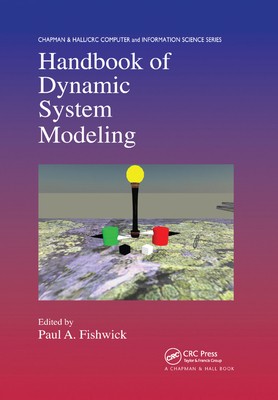
- Mēs nosūtīsim 10-14 darba dienu laikā.
- Izdevējs CRC Press
- ISBN-10 : 0367389045
- ISBN-13 : 9780367389048
- Formāts: 17.8 x 25.2 x 4.1 cm, minkšti viršeliai
- Valoda: Anglų
- Extra -10% atlaide, ievadot kodu: EXTRA
Handbook of Dynamic System Modeling + bezmaksas piegāde! | Bookbook.lv
Atsauksmes
Apraksts
The topic of dynamic models tends to be splintered across various disciplines, making it difficult to uniformly study the subject. Moreover, the models have a variety of representations, from traditional mathematical notations to diagrammatic and immersive depictions. Collecting all of these expressions of dynamic models, the Handbook of Dynamic System Modeling explores a panoply of different types of modeling methods available for dynamical systems.
Featuring an interdisciplinary, balanced approach, the handbook focuses on both generalized dynamic knowledge and specific models. It first introduces the general concepts, representations, and philosophy of dynamic models, followed by a section on modeling methodologies that explains how to portray designed models on a computer. After addressing scale, heterogeneity, and composition issues, the book covers specific model types that are often characterized by specific visual- or text-based grammars. It concludes with case studies that employ two well-known commercial packages to construct, simulate, and analyze dynamic models. A complete guide to the fundamentals, types, and applications of dynamic models, this handbook shows how systems function and are represented over time and space and illustrates how to select a particular model based on a specific area of interest.10 EXTRA % atlaide
Kupona kods: EXTRA
Akcija beidzas 7d.00:25:25
Atlaides kods derīgs pirkumiem no 10 €. Atlaides nav kumulatīvas.
Derīgs tikai pirkumiem tiešsaistē.

- Izdevējs CRC Press
- ISBN-10: 0367389045
- ISBN-13: 9780367389048
- Formāts 17.8 x 25.2 x 4.1 cm, minkšti viršeliai
- Valoda: Anglų
The topic of dynamic models tends to be splintered across various disciplines, making it difficult to uniformly study the subject. Moreover, the models have a variety of representations, from traditional mathematical notations to diagrammatic and immersive depictions. Collecting all of these expressions of dynamic models, the Handbook of Dynamic System Modeling explores a panoply of different types of modeling methods available for dynamical systems.
Featuring an interdisciplinary, balanced approach, the handbook focuses on both generalized dynamic knowledge and specific models. It first introduces the general concepts, representations, and philosophy of dynamic models, followed by a section on modeling methodologies that explains how to portray designed models on a computer. After addressing scale, heterogeneity, and composition issues, the book covers specific model types that are often characterized by specific visual- or text-based grammars. It concludes with case studies that employ two well-known commercial packages to construct, simulate, and analyze dynamic models. A complete guide to the fundamentals, types, and applications of dynamic models, this handbook shows how systems function and are represented over time and space and illustrates how to select a particular model based on a specific area of interest.
Atsauksmes